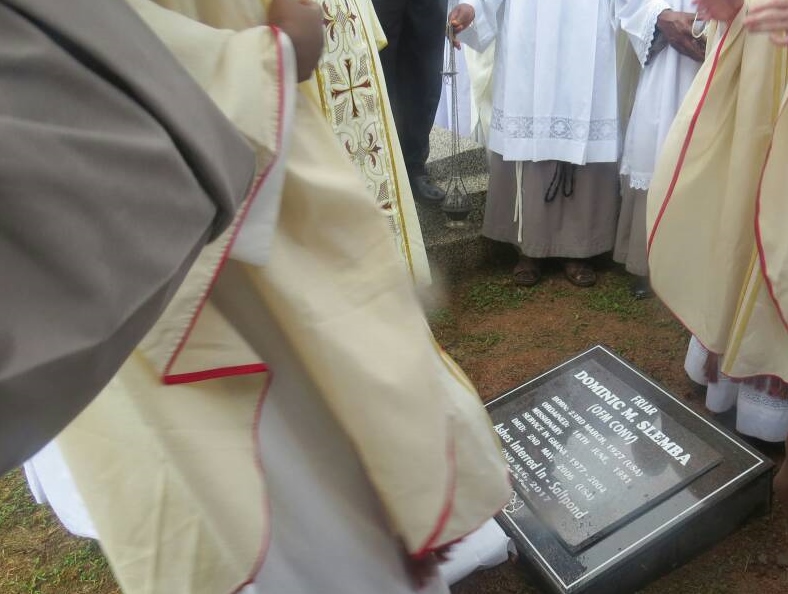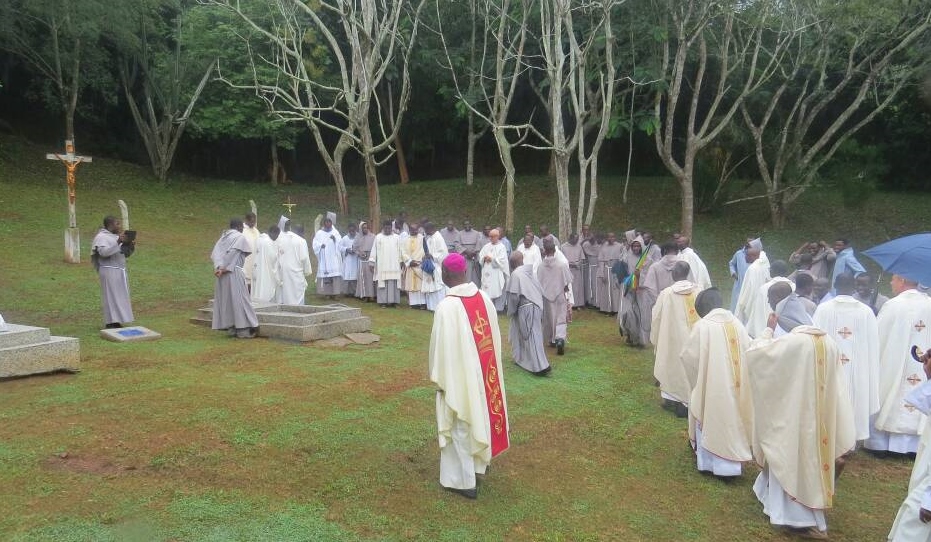 Our Lady of the Angels Province Minister Provincial, the Very Reverend Fr. James McCurry, OFM Conv., translated to the St. Francis Novitiate and Spirituality Center in Saltpond, Ghana, the remains of the late +Friar Dominic Slemba, OFM Conv. (1927- 2006). On the Feast Day of Our Lady of the Angels, August 2nd the community celebrated the Memorial Mass and Interment of +Fr. Dominic, who served as a friar missionary there. In 1977, +Friar Dominic was one of the first group of friars from the former St. Anthony of Padua Province (whose friars joined those of Immaculate Conception Province to create Our Lady of the Angels Province in 2014) to open a mission in Ghana, West Africa. From 1978 – 1984, +Friar Dominic continued his missionary work of forming new friars by serving as the Director of Novices, at St. Francis Novitiate, in Saltpond. +Friar Dominic then served as the Director of Formation and Guardian at the Our Lady of the Portiuncula Friary, in Cape Coast, Ghana until 1988 when he resumed his work in Saltpond, serving again as Director of Novices and then as a staff member of the Spirituality Center. In 2004, suffering from cancer, +Friar Dominic left his beloved Ghana and returned to the United States. Sister Death greeted him in 2006 after a long fought battle and he was buried in the Friars’ Mausoleum in St. Stanislaus Cemetery, in Baltimore, MD.
Our Lady of the Angels Province Minister Provincial, the Very Reverend Fr. James McCurry, OFM Conv., translated to the St. Francis Novitiate and Spirituality Center in Saltpond, Ghana, the remains of the late +Friar Dominic Slemba, OFM Conv. (1927- 2006). On the Feast Day of Our Lady of the Angels, August 2nd the community celebrated the Memorial Mass and Interment of +Fr. Dominic, who served as a friar missionary there. In 1977, +Friar Dominic was one of the first group of friars from the former St. Anthony of Padua Province (whose friars joined those of Immaculate Conception Province to create Our Lady of the Angels Province in 2014) to open a mission in Ghana, West Africa. From 1978 – 1984, +Friar Dominic continued his missionary work of forming new friars by serving as the Director of Novices, at St. Francis Novitiate, in Saltpond. +Friar Dominic then served as the Director of Formation and Guardian at the Our Lady of the Portiuncula Friary, in Cape Coast, Ghana until 1988 when he resumed his work in Saltpond, serving again as Director of Novices and then as a staff member of the Spirituality Center. In 2004, suffering from cancer, +Friar Dominic left his beloved Ghana and returned to the United States. Sister Death greeted him in 2006 after a long fought battle and he was buried in the Friars’ Mausoleum in St. Stanislaus Cemetery, in Baltimore, MD.
At the request by those he served so faithfully, permission was granted and Friar James McCurry, OFM Conv. traslated the remains of +Friar Dominic back to Ghana. The Memorial Mass and Interment lasted three hours, concluding under lashing rain at the grave-site in the “Franciscan Valley of Prayer and Silence.” Cardinal Peter Turkson, who serves as President of the Pontifical Council for Justice and Peace in Vatican City, was the main celebrant. Cardinal Turkson was assisted by the Archbishop of Cape Coast – the Most Reverend Matthias Kobena Nketsiah, as well as the Custos of the Order’s Ghanaian Custody of St. Anthony – Fr. Anthony Bezo Kutiero, OFM Conv. and the Fr. James. Not even the drenching downpour, as it was Ghana’s legendary “Rainy Season,” dampened the exuberant spirit of the day. A fitting summary can be found in the succinct and memorable words of the Archbishop: “Fr. Dominic was an American by accident, but a Ghanaian by Divine appointment!”
Tribute given by Bro. David Kwaw, OFM Conv.
the last surviving member of +Fr. Dominic’s first Formation Class, in Ghana:
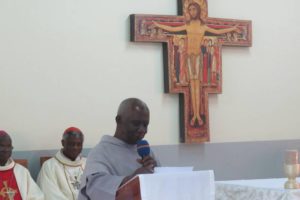 In the book “The Pain of Being Human” by Eugene Kennedy, the writer wrote, and I quote: “There is a kind of pain in life that has nothing to do with sickness or sometimes savagery. This is the suffering of healthy person, as dramatic as it is inevitable, as commonplace as it is uncomforted. It is the pain with thousand private faces, the pain that comes from just being human.”
In the book “The Pain of Being Human” by Eugene Kennedy, the writer wrote, and I quote: “There is a kind of pain in life that has nothing to do with sickness or sometimes savagery. This is the suffering of healthy person, as dramatic as it is inevitable, as commonplace as it is uncomforted. It is the pain with thousand private faces, the pain that comes from just being human.”
+Fr. Dominic Slemba underwent that pain of being human when he realised that his desire to die in Ghana and be buried in Ghana had failed. On that fateful day when he was leaving Saltpond under implicit obedience, he was in pain. His head was down with his eyes half closed. His steps were uneven. That was not due to his physical sickness, but the pain of leaving Ghana for good. As holy obedience demands, and as he believed in holy obedience, he obeyed his superior and left Ghana for good.
Today, we have gathered here to do honor to Fr. Dominic Slemba; to welcome the remains of Fr. Dominic Slemba back to Ghana and lay him at the very place he designated as the burial ground for the Friars. Fr. Dominic, you are welcome back to Ghana; and we are happy to welcome you back. Your desired dream has been fulfilled.
Fr. Dominic Slemba, OFM Conv. arrived in Ghana in 1977, with three other Friars from St. Anthony of Padua Province, USA (Fr. Isidore Kolwaski Fr. Ignatius Piatek and Bro. Vincent Vivian) to sow the Franciscan Way of Life in Ghana. He was the Provincial Delegate of the Mission and the Superior of the group. Their first settlement in Ghana was the second bungalow of the Archdiocese, Cape Coast, close to St. Augustine College. His immediate role was to establish the Franciscan Way of Life in Ghana by recruiting and training Ghanaians who may desire to follow Jesus in the footsteps of St. Francis of Assisi. Hence he arrived in Ghana as a Novice Director without novices. But he worked to achieve that dream in the shortest possible time.
By December 1977, he had enrolled five Ghanaians and feverishly prepared them to enter into Novitiate. The late +Archbishop John Kodwo Amissah gave them the sister’s convent in Saltpond to start the Novitiate, causing the need for Fr. Dominic to rent a house for the three Infant Jesus sisters’ relocation. The house was just across the road. In the second week of September 1978, Fr. Dominic moved to Saltpond to get himself ready to welcome the five candidates for the Novitiate.
On October 4, 1978, Fr. Dominic received the first group of five Ghanaians into novitiate. The private ceremony took place in the small chapel of the convent. The gathering included the Novice Director and the five to be Novices. No other person was present. Since the five candidates had never seen an Investiture of Novices before, it was a joyful moment for the five and their director. That evening, Fr. Dominic organised the first “fresh bread” party. The food for the party was bread with groundnut paste and water. When we had finished with what we had, Fr. Dominic said, “This is a good party with Lady Poverty.” Some of the newly invested giggled and some laughed. Fr. Dominic turned round and said to them, “If you don’t like peanut and bread, you have no vocation.”
Fr. Dominic’s dream was not only a Novitiate but a place to house the novices after their Profession of Vows. Again, he turned to the late Archbishop John Kodwo Amissah and the 4th Ridge building, the current Secretariat of the Archdiocese, was given to the Franciscans to begin as a Formation House.
As a Provincial Delegate, Fr. Dominic sought places to put up Formation Houses. Simultaneously, he started building the Novitiate House in Saltpond and the Formation House in Cape Coast. At the same time he started looking for land to build the House at Sowutuom. He was a Formator and knew what to do to train people to become religious and priests in the Franciscan family. He never lost his focus. He faced many challenges but never gave up. He stood tall to lay the foundation of the Conventual Franciscan Order in Ghana.
As a good Missionary and a good Formator, he combined book, spirituality and manual labor as a single tool in all his Missionary work. He was a very hard worker and loved neat surroundings. One day, something of great interest happened. On the narrow road that lead to the sister’s house was a public toilet. That small area was very unpleasant to pass-by. The time was 3.00pm, which was the normal time for the novices to work in the afternoon. He was the first person to come down, all dressed for work. He gave the command, “Collect all the shovels and the cutlasses,” and the novices did so. His next command was “Let’s go,” and the novices followed without questing where. After crossing the main road, he said, “We are going to clean around the public toilet and make the place neat.” One novice shouted, “Father how?” He turned to look at the novice and said, “Obeye few.” Believe it or not, the novices were made to clean the surroundings of that public toilet to the amazement of the many passerby and they were given the name “obeye few.”
Fr Dominic was a father to the poor and had the poor, at heart. He believed that the more you give to the poor, the more God gives you to the poor. He had a generous heart and could never say “No” to anyone who begged from him. He did give so generously that sometimes people, even those who had, took advantage of his generosity by lying and cheating him.
He was a man of prayer and loved to pray. He was a strong devotee to Our Lady and never dropped his Rosary. The last thing he will do before going to bed was to visit the Blessed Sacrament in the quietness of the night, for fifteen minutes. He believed that it is safer and better to sleep before the Blessed Sacrament than any other place in the world.
He had a vision for a Marian Center at Saltpond and worked towards it. He started the hermitage experience, where people come and be alone with the Lord in prayer. He worked very hard to create the path for the Stations of the Cross, as we have it today. The Marian grotto, the Divine Mercy chapel, the Bethlehem, the Garden of Gethsemane, the Heaven, and the Millennium church for bigger groups were all his dreams and his investments. He worked very hard to lay a good spiritual foundation for teh benefit of many people.
For his hard work, Fr. Dominic discovered one medicine while he was in Saltpond, known as “African medicine,” which he alone took in the night and was only effective for him. What was it? It was mixture of fresh corn dough and peanut paste in a bowl. He loved it and he would eat that mixture every night before he went to bed. God gave him a good missionary stomach.
His life in Ghana from 1977 to 2004 lasted twenty seven years. Out of these twenty seven years, he was a Novice Director for twenty two and a Director for Students for five. He was a born Formator and a great Formator, who played a deserving role in laying the Foundation of the Conventual Franciscan Order in Ghana. His dream and his work are bearing fruits. May God multiply the yield for generations to come.
Amen.
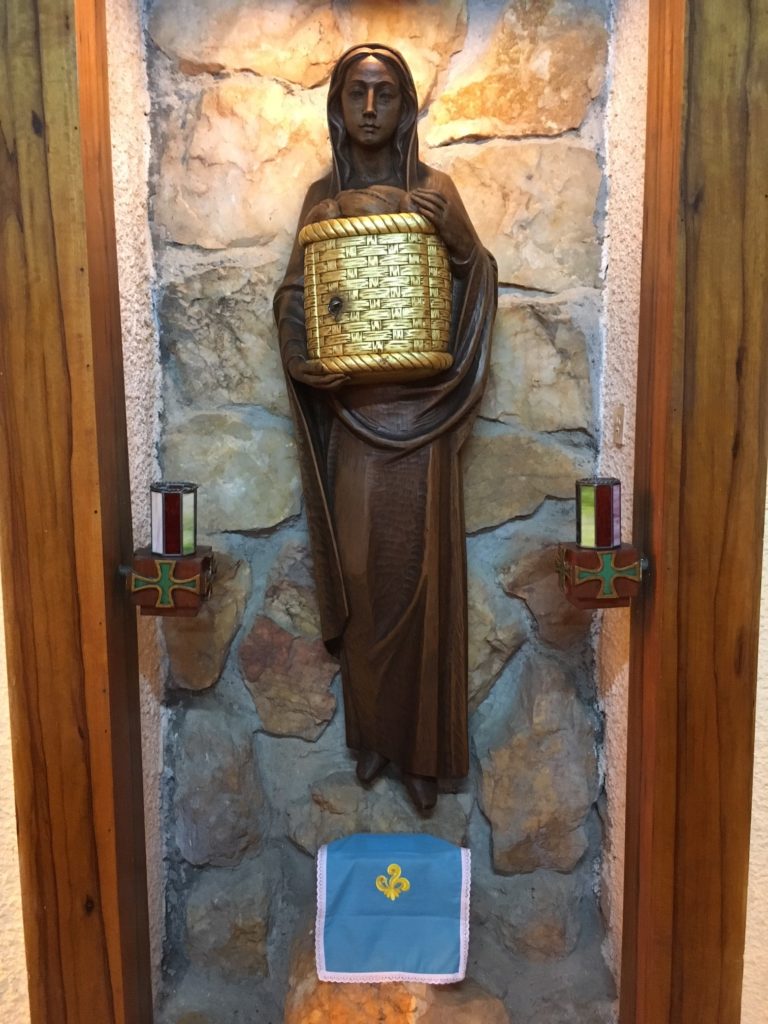
Before Mass, +Fr. Dominic’s cremated remains reposed beneath the Tabernacle which he installed at the Saltpond Novitiate Chapel, while serving there.
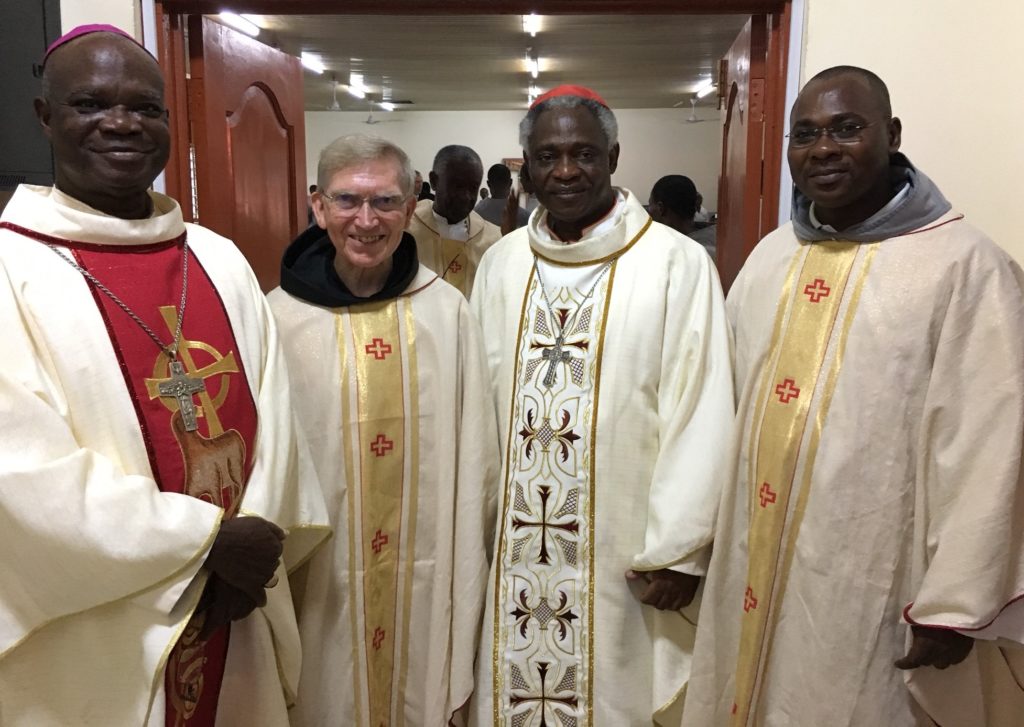
Archbishop of Cape Coast – the Most Reverend Matthias Kobena Nketsiah, Minister Provincial of Our Lady of the Angels Province – the Very Reverend Fr. James McCurry, OFM Conv., President of the Pontifical Council for Justice & Peace in Vatican City – Cardinal Peter Turkson, Custos of the Order’s Ghanaian Custody of St. Anthony – Fr. Anthony Bezo Kutiero, OFM Conv.
